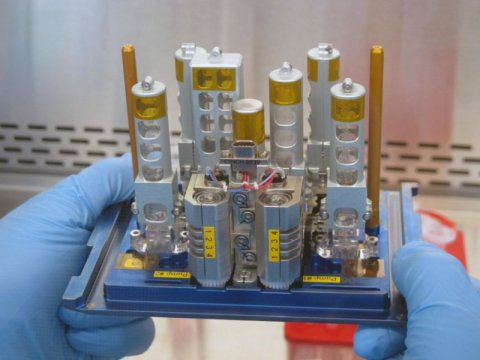Mammalian cells are optimally adapted to gravity. But what happens in the microgravity environment of space if the earth’s pulling force disappears? Previously, numerous experiments showcased cell changes, after hours or even days in zero gravity. Astronauts, but, returned to Earth without any severe health issues after long missions in space, which begs the question as to how efficient cells are of adapting to changes in the gravity.
Based on real-time readings on the ISS, UZH researchers can now disclose that cells are able to respond to changes in the gravitational conditions extremely swiftly and keep on functioning. Therefore, the study also offers direct evidence that specific cell functions are linked to gravity.
In contrast to the space experiments, where analyses are conducted afterwards on Earth, the group headed by UZH researchers. Oliver Ullrich and Cora Thiel opted for a distinct route. They geared their experimental design towards conducting direct estimations in space.
From thawing the test cells to the estimates themselves, ESA astronaut Samantha Cristoforetti performed all the operations directly in the laboratory on the ISS. The information gathered on the space station was then transferred to Earth. Rigorous external and internal controls excluded any influence other than gravity.

The scientific group employed the so-called oxidative burst – an old evolutionary mechanism to kill off bacteria through defense cells to study how rat cells responded to changes in gravity. With the support of centrifuges, Cristoforetti altered the gravitational conditions on the ISS, which allowed the group in the regulation to track how the cells reacted.
“Ultra-rapidly,” explains Oliver Ullrich, a lecturer from the Institute of Anatomy at the University of Zurich. “Although, the immune defense collapsed as soon as zero gravity hit, to our surprise the defense cells made a complete recovery within 42 seconds.” For Thiel and Ullrich, the direct evidence of a rapid and complete adaptation to zero gravity in less than a minute begs the question as to whether previous cell changes measured after days or hours were also the result of an adaptation procedure.
“It seems paradoxical,” says Thiel. “Cells are able to adapt ultra-swiftly to zero gravity. However, they were never revealed to it in the evolution of life on Earth. Hence, the results raise more questions regarding the robustness of life and its astonishing adaptability.” In any situation, as far as Ullrich is concerned the result of the ISS experiment is good news for manned space flight. “There is still hope that our cells are able to cope much better with the zero gravity than we previously considered.”
Filed Under: News


Questions related to this article?
👉Ask and discuss on EDAboard.com and Electro-Tech-Online.com forums.
Tell Us What You Think!!
You must be logged in to post a comment.